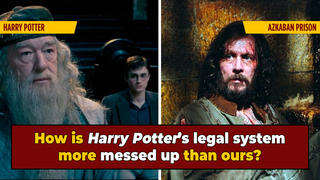'Harry Potter's Justice System is Completely Messed Up

You'd think criminal matters would be easy enough to resolve in the Wizarding World, considering all the tools at their disposal. There's that hat that can read minds, for one thing. They can also check people's wands to find out what spells they've cast as easily as pulling up your Google history. That one's not foolproof because people can use each other's wands, but it would have, for example, lent major credence to Sirius Black's defense that he was framed by his "victim," Peter Pettigrew. After all, he couldn't have used Pettigrew's wand -- it was "destroyed" in the blast. (That would be like a gun shooting itself.)
Except Sirius was never given a chance to formally present his defense because he wasn't even given a trial. There was hardly even an investigation -- no forensics, no interrogation. He was seen standing in the vicinity of a crime; some cops asked some witnesses, "Was it this guy?" and they said, "We think so," and that was enough to sentence a man to a lifetime of torture that even the most corrupt real-world governments would consider a bit much. They don't even need that much evidence. Hagrid is hauled off without a trial for reopening the Chamber of Secrets based on high school disciplinary records that indicated (again, without much evidence) that he'd done it 50 years before.
It would be one thing, though still outrageous if they were just taking them somewhere with an uncomfortable bed and bad food, but we're talking about a prison where malevolent specters roam the halls, forcing you to relive your worst nightmares over and over while they suck the physical lifeforce out of you until you're nothing but an empty shell. In any just world, Hagrid would be rolling in wrongful imprisonment galleons.
It's not much better when you do get a trial. When Harry is brought in for using magic in front of a Muggle (to repel those fear monsters, which had escaped into England at large), the court gets away with changing the time of his hearing without notifying his representative, who isn't even a lawyer.
They don't seem to have those, and they definitely don't have the right to one. When they question Harry, it's clear that it was the first time they'd heard his defense, and they immediately dismiss it without even checking if any guards went missing from Azkaban recently. Harry is only saved (from Azkaban? Do they have a separate facility for children? If they do, they don't mention it!) by a vote from the court because that's how convictions are apparently determined. There's no standard of reasonable doubt, no requirement of unanimity. If enough people in the room like you, you're good; if you fail to convince even one fewer person than you do, it's off to Soulsuckingville.
At that point, it's pretty clear that the government is at least a somewhat-villain, but the good guys all seem to be generally fine with it. Sure, they get mad when they fall on the wrong side of it, but just in the "Aw, man, my buddy's in jail" kind of way, not the "We need to call the ACLU -- wait, shit, do we have an ACLU?" kind, and they certainly don't mind when it works in their favor. Even Hermione, who is so passionate about social justice that she drags house elves to freedom against their will, which is a whole other thing, is suspiciously silent on the matter. In fact, she grows up to become a cop. "How many innocent people has Emma Watson sent to a brand new circle of hell?" isn't a question anyone wants to ask, but here we are.
Top image: Warner Bros.